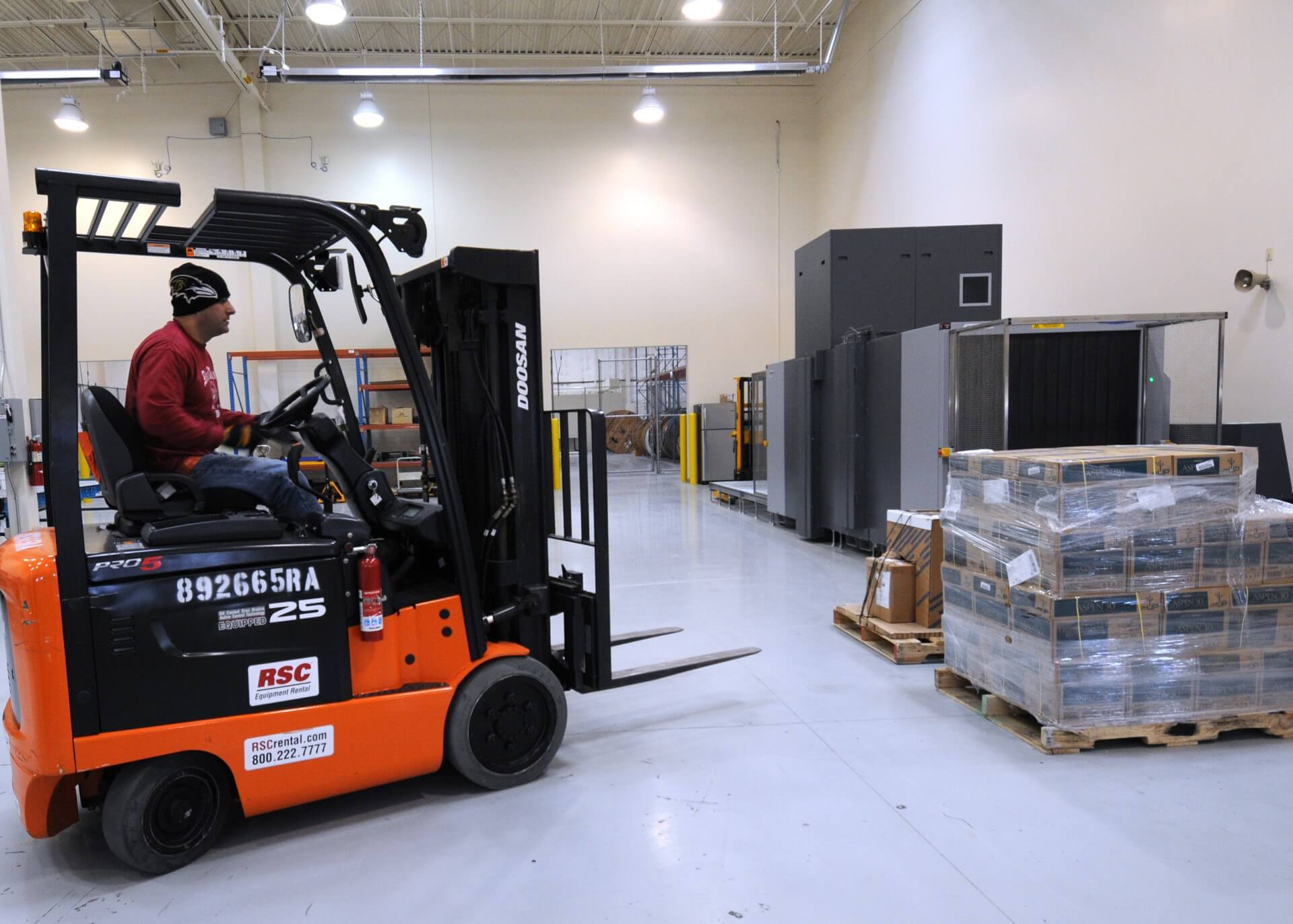Many business owners in the materials handling industry are unaware of the benefits of simply hiring forklifts in the long-term instead of purchasing them.
Although purchasing forklifts for your business can be a valuable investment, there are many other hidden costs that come with owning forklifts. Furthermore, forklift work may be a very minor part of your business operations. Some business owners will even consider purchasing forklifts for a specific project, only to then never use them again. This is a considerable waste of money, and an example of where hiring a forklift would be a more sensible option. Renting can also allow business owners to make use of expensive equipment that may be unaffordable to purchase, this is particularly true for startups, where business capital is minimal. There are a number of reasons why you may wish to hire a forklift long-term than purchase, and hiring can actually come with many benefits.
The benefits of long term forklift hire
Long-term forklift hire is a good solution for any business that requires a forklift for any of their operations. This includes regular use, or simply using the machinery for a single project. If you are a small business that cannot afford to purchase a forklift, hiring can be a great option to help your business grow without the huge expense. As with all machinery, forklifts require regular maintenance; this isn’t so great when you are the owner of the forklift. Such maintenance and repairs can be costly, but these costs are often covered by the company hiring out the product. It is important to remember that the breakdown of machinery doesn’t only cost a business money, but also valuable time. For example, if a forklift is broken, this may result in a halt in business practices.
Some hire companies additionally offer breakdown cover or all-inclusive packages that include the cost of parts, labour and other hidden extras. Occasionally, businesses may require additional forklifts at busy times of the year. In these instances, hiring a forklift is preferable to purchasing, particularly when you consider your return on investment over the seasonal periods.
Hiring a forklift will also give you more flexibility when it comes to changing models and types of truck. Often, in the ever-changing materials handling industry, a business can’t predict which type of forklift they will need from one month to the next. For example, a business may require a heavy-duty truck for a certain period of the year and be able to operate sufficiently with a more compact model during other periods. Most businesses cannot afford to pay out for different forklifts each time their requirements change or even have the storage space for several unused trucks. Hiring gives businesses the flexibility to change their hire requirements throughout the year without the expense that comes with purchasing new machinery each time it is needed.
Long-term hire process
The process of hiring a forklift long-term is fairly simple. First, it is important to clearly define what your company requires. This means assessing your workload and identifying tasks that you may encounter in the near future. Determine whether you will require heavy-duty or compact equipment and if you’ll need more than one forklift. Once you have an idea of your specifications, you will then be in an easier position when it comes to agreeing to a hire contract that suits you. However, if you don’t know what you require, you can call for more information and discuss your requirements with us and we can help you find a plan that is suitable for you. Once we have established the machinery and length of hire that is right for you, you’ll then be asked to sign a long-term hire contract. You will also be given the opportunity to add additional options to your hire agreement and information about maintenance and servicing and cover.
How to calculate the equipment rental rates
Calculating the rental rates of equipment such as forklifts can be fairly confusing. The way to calculate hire rates can differ depending on the type of rental contract that you commit to. Some hire companies will offer equipment that will cost you a flat fee depending on the time it is hired for. For example, if a forklift is hired by a company for 6 months and two weeks then the company will be charged whatever the tariff states (6x Monthly charge, 2x weekly charge), plus VAT and any other agreed costs. Other long-term hire contracts are on a lease basis. This means the company is essentially hiring the equipment for a set period of time and paying a monthly cost for this. Often, maintenance is included in a lease-based contract and factors into the monthly cost. Calculating monthly payments with a lease-based contract is based on the length of the lease, the value of the equipment and the type of business it is required for. Whichever type of long-term hire contract you decide on, the details regarding the calculation and breakdown of monthly payments will be provided to you before you sign a contract.
What are rental charges of materials handling machinery like?
Rental charges of materials handling machinery can vary depending on the type of machine that you need. Rental costs are usually based on the overall value of the machine, so if a piece of machinery is worth £100,000, it is going to cost considerably more to hire than one that is worth £10,000. With most standard 2000-2500kg forklifts on the market currently costing just under £15,000, the cost of buying can quickly add up, particularly if your business needs several at one time. Rental charges are often very affordable, and allow businesses to pay for expensive equipment only when they need it and without the initial outlay. Some forklifts can cost as little as £50 per week to hire, this is an incredibly modest amount when you consider the benefits it can provide to your business. Other machinery like mini diggers can cost around £300 per week to hire – again, this is a small price to pay for what it can bring to a business.
Why do companies rent forklifts rather than buying them?
Many companies choose to rent forklifts instead of buying them as they simply don’t have the space to store them in the long-term. Although keeping materials handling equipment outside is generally okay in the short-term, keeping this type of equipment outside for years at a time can be detrimental. Storing equipment can use valuable space in business premises, and may even require a business to pay additional costs to store the machinery that they own away from the site. This doesn’t really make sense, especially if the company only uses its forklifts for certain periods of the year. Renting means not wasting space by storing equipment when it isn’t needed.
Having a healthy capital is important to the success of a business. This means that if a company uses a large portion of their capital on buying expensive machinery, it may not be available when it’s really needed. This means that the business may miss opportunities as a result of purchasing forklifts that are rarely used. Freeing up capital is something that many business owners consider when they choose to hire materials handling equipment and forklifts.
With the nature of business being ever-changing, some companies choose to rent equipment due to a change in circumstances. This can mean for example that their operations have changed and are more centred around the use of other types of machinery, or that they have relocated with limited storage space. In these instances, renting on a needs-only basis is usually recommended.
What are the benefits of hiring heavy equipment?
There are a number of benefits associated with hiring heavy equipment, the main one being that the cost is significantly less. Paying a low monthly payment for a piece of machinery that costs a considerable sum of money in order to make money for your business is a much less risky solution than purchasing the equipment. Furthermore, in regards to tax purposes, hiring heavy equipment can actually save you money. As hire equipment isn’t considered a fixed asset, and hire costs will contribute towards your overall operating costs, hiring can be tax-efficient.
Purchasing heavy equipment can come with many downsides, although the equipment will be owned by your business, you will be fully responsible for it. This doesn’t only mean covering all maintenance, repair, servicing, licencing, insurance, and other costs, but it also means having the responsibility of an asset that devalues over time. When it comes to heavy equipment, you ideally want the machinery to hold its value as much as possible. However, depending on how often you use it and how many advances there are in technology between the date you purchase it and when you decide to sell it, its value can greatly depreciate. Hiring heavy equipment means that you can upgrade it when newer more advanced models are available, without having to find a buyer for your old equipment.
There are many things to consider regarding health and safety in the manufacturing industry. Owning machinery can put additional responsibility on your business when it comes to ensuring that all of the machinery is kept to the correct safety standards and is protected by up-to-date licences. This is a lot to take care of and, with ever-changing legislation and health and safety regulations, it is easy to miss certain details. Hiring equipment means that you’ll have the support of the hiring company to ensure that all of the machinery is kept to legal standards and is correctly licensed.

